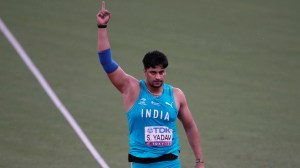Developing cluster: G-110 takes shape
For the first time in the history of the World Trade Organisation (WTO), all the developing country groups came together on one platform, cr...

For the first time in the history of the World Trade Organisation (WTO), all the developing country groups came together on one platform, creating a new coalition called the G-110. The new grouping asked the developed nations not to lose focus on the developmental objectives of the Doha Round.
The move is likely to put tremendous pressure on the EU and US, who have been evasive on the core issue of agricultural subsidies so far this week.
Representatives from the G-90, the G-20, the G-33, the ACP (African, Caribbean and Pacific nations), the LDCs (Least Developed Countries), the African Group and the Small and Vulnerable Economies, called for a complete elimination of developed countries’ export support measures by 2010 and reaffirmed the need for substantial reductions of trade-distorting domestic support.
Brazilian Foreign Minister Celso Amorim called the G-110 formation a ‘‘historic moment…It is a very concrete, very pragmatic way of finding common solutions for the problems of developing countries.’’ Zambian Trade Minister Dipak Patel, representing the LDCs, stressed, ‘‘We are not going to lose focus of the mandate we have, to press the long-standing demand of duty-free, quota-free access to developed countries’ markets.’’
Despite the strong words, it’s unlikely that the EU and US will bring forth any fresh proposals over their agricultural subsidies in the two days left for the meet to end. But through G-110, the developing world has given them a strong indication that unlike in the past, they won’t be pressurised into signing a bad deal any more.
Already, a worried EU Trade Commissioner Peter Mandelson was heard saying between meetings that the talks are headed in the wrong direction. ‘‘It’s hard to see where progress can be achieved in Hong Kong if the talks continue in their present direction,’’ he said.
According to senior Indian commerce ministry officials, a package for LDCs is likely to be finetuned and finalized by this evening.
Commerce and industry minister Kamal Nath came out strongly against the developed nations, saying, ‘‘I am surprised that in the big hall outside, everybody talks of development and a Round-for-free for the LDCs. But in the Green Room, it becomes a Round-for-Free for themselves.’’
The ministers representing these developing country groups came out strongly against the EU and the US’ obstinate refusal to discuss their agricultural subsidies, that make agriculture the most structurally-imbalanced component of global trade.
Both EU and US have been saying that Advanced Developing Countries should also help the LDCs. While India and Brazil are working on packages for preferential treatment for LDCs, Nath noted that there is a new trend of developed countries preaching South-South trade.
India unhappy with Agri draft
Hong Kong: As negotiators continue to try and hammer out a limited deal from the Hong Kong Ministerial Meet, a sketchy draft text on agricultural issues was put out this evening. While it does take into account the demand of developing countries like India to safeguard their tariff lines on Special Products and elements of the Special Safeguard Mechanisms, a Commerce Ministry official told The Indian Express that it still leaves a lot to be desired. On the other key demand of developing nations that developed ones set a deadline for eliminating agri subsidies, the year 2010 has been mooted. But the date remains in brackets as the EU has still not agreed.
Photos



- 01
- 02
- 03
- 04
- 05




























